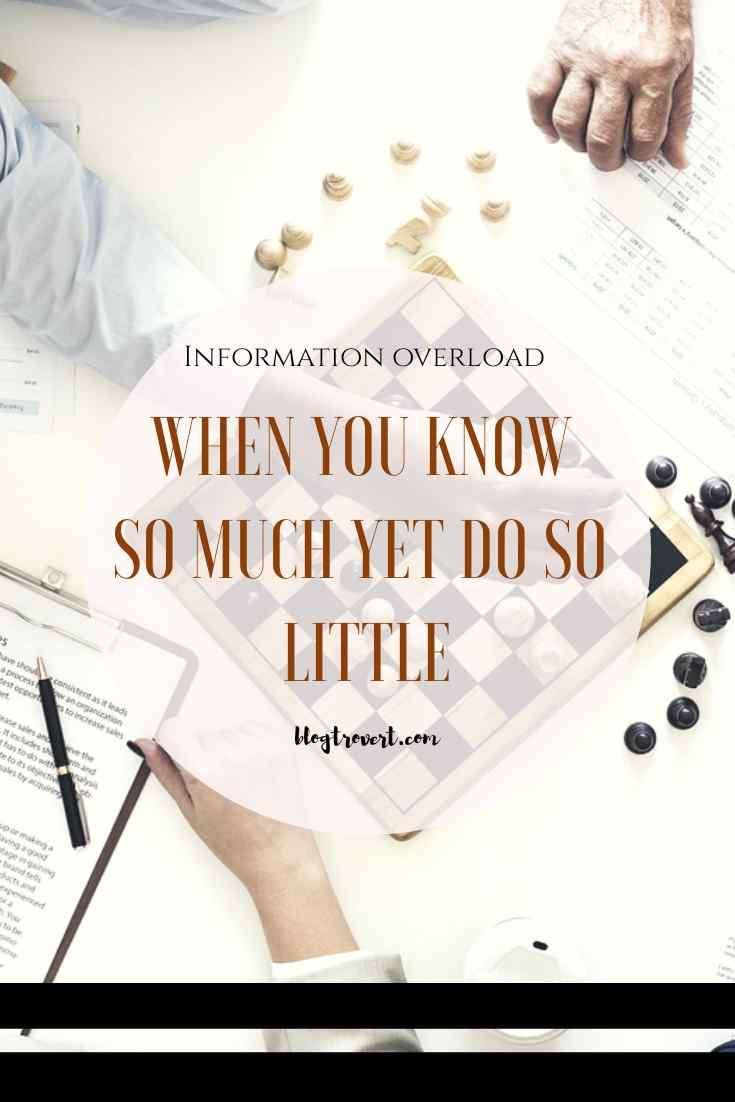
We are constantly getting information from all sides, every minute of our lives. Emails, social media updates, instant messaging, news articles, blogs, podcasts, and videos; the list of information sources is endless, and the amount of information they generate is staggering.
With so much information available to us, it’s easy to get overwhelmed and feel like we’re drowning in a sea of data. But how do we deal with this information overload to make sure we stay productive and efficient?
Now, the question is, do you want to know how to deal with information overload?
In this blog post, we will explore some of the most effective strategies for managing information overload. We’ll look at techniques for prioritizing information, filtering out irrelevant details, and focusing on what’s really important.
What is information overload?
Information overload (also known as infobesity or infoxication) is a term used to describe the difficulty of understanding an issue and effectively making decisions when one has too much information about that issue. – Wikipedia
With the above definition, an excerpt from Wikipedia’s article on information overload, you will have gotten an insight on what the term is all about knowing what you are experiencing or have experienced in the past.
Information overload can be a serious problem for individuals, businesses, and society as a whole. It can lead to decreased productivity and efficiency, confusion, and even health issues.

What causes information overload?
A variety of factors lead to information overload, including the ever-growing amount of information available online and in the workplace, increased work demands, and our constantly growing digital world. Here are some of the most common causes of information overload:
The expanding amount of online content
With so many sources of information available online, it’s hard to determine which sources are reliable and trustworthy. It’s important to stick to reputable sources of information, especially if you plan on using that information in your professional activities.
Increased work demands
Professionals expect to do more with less time than ever before. If you’re feeling overwhelmed by your work responsibilities, it may be because your boss or clients’ demands too much from you.
Take some time off to relax and rejuvenate yourself, and you’ll be better prepared to tackle the new challenges ahead.
The ever-changing digital world
The digital world is constantly developing, which can cause a lot of stress if you’re not up-to-date on recent developments.
Make use of helpful tools like Google Search and Google Sheets to help you find the information you need quickly and easily.
Avoid keeping up with trends and developments that you do not need. You don’t have to be up-to-date on all the latest trends.
How to deal with information overload
We can reduce information overload by developing a system for sorting and reviewing the information we take in.
Here are a few ways that will show you how to deal with information overload;
Focus on one task at a time
How to deal with information overload?
One of the most effective ways to manage it is by focusing on one task at a time. It can be tempting to open multiple tabs, check your email constantly, and have notifications popping up left and right.
However, this constant multitasking can actually hinder your productivity and increase your stress levels. Focusing on completing one task at a time gives your brain the chance to fully concentrate and be efficient.
So, turn off those notifications and prioritize your tasks. It will surprise you at how much you can accomplish without feeling overwhelmed.
Prioritize important information
A flood of information bombards us every single day, overwhelming us to decide what is really important. However, it is vital to prioritize the important information to avoid feeling lost and confused.
When we know what is essential, we can handle it better and make informed decisions without getting bogged down by irrelevant data.
The key to knowing how to deal with information overload is to be selective in the information we consume and prioritize the information that fits our goals and objectives. This way, we can reduce the risk of getting lost in the sea of data and stay solution-focused.
Always remember that you can reduce information overload by taking the time to identify the essential information that is pertinent to our needs. With proper prioritization, we can tackle information overload with ease and stay focused on our goals. Prioritize your goals and objectives, and to focus on the most important tasks first.
Set specific goals for the day
One of the best tips for understanding how to deal with information overload is knowing how to set specific goals for the day. Create a realistic to-do list and prioritize according to its importance.
Focusing on the most critical tasks at first will help you manage information overload effectively. It also helps to have a clear vision in mind, a picture of what your day should be like.
With that said, avoid distractions and unnecessary information and you will reduce information overload drastically. Achieving your daily goals gives a sense of accomplishment, boosting your motivation and productivity further.
In short, setting specific daily goals and working to achieve them is a simple but powerful way to deal with information overload.
Learn to say no to distractions
Everywhere we turn, there’s a new notification popping up, a new email to respond to, or a new article to read.
If we want to achieve success and manage information overload, we have to learn to say no to distractions. This means making a conscious effort to prioritize our time and attention, and recognizing that not all information is essential.
Create boundaries for yourself and stick to them. Establish specific times during the day or week when you will not check your email, and stick to them. This will help you focus on what is important and protect your time.
So next time you’re feeling overwhelmed by the endless stream of information, remember that it’s in your power to manage it. With determination and discipline, you can reduce information overload and achieve your goals.
Take breaks to recharge your mind
It’s challenging to manage the constant influx of new data and prevent ourselves from feeling overwhelmed. With this in mind, it’s vital to take breaks and recharge our minds periodically.
Whether it’s a 10-minute meditation session or a quick walk around the block, taking breaks can help reduce stress, improve focus and creativity, and increase overall productivity.
So next time you’re feeling bogged down by information overload, take a break and give your mind a chance to recharge. By doing so, you’ll be able to better manage information overload and stay on top of your game.
Use technology to streamline tasks
One of the most effective ways to deal with information overload is to use technology to streamline tasks. Technology has revolutionized the way we work, study, and communicate, and it can also help to manage information overload.
With the right technology tools, you can easily prioritize and organize information, automate repetitive tasks, and reduce distractions.
Use apps and software designed for productivity, time management, and organization. These tools can help you create to-do lists, manage your email inbox, schedule meetings, and track your progress.
When you use technology to streamline tasks, you can focus more on the important things, maximize your productivity, and ultimately reduce your stress levels.
So, embrace technology and use it to your advantage, and you’ll be well on your way to managing information overload.
Organize your workspace and digital files
One of the most effective ways to deal with information overload is to organize your workspace and digital files. A cluttered desk or computer can contribute to added stress and anxiety, making it difficult to focus on the task at hand.
How to manage information overload?
- Start by decluttering your workspace and desktop.
- Get rid of any unnecessary items or papers and file important documents in their proper place.
- Clean up your digital files by creating folders and labeling them accordingly.
This way, you can easily find what you need without feeling overwhelmed by the sheer amount of information you have to sift through.
By keeping your workspace and digital files organized, you can create a sense of calm in your work environment and increase productivity. So, take a deep breath and start organizing. It’ll amaze you at how much better you’ll feel once you’ve tackled the chaos.
Practice mindfulness and meditation
Practicing mindfulness and meditation can help us focus our attention and be more present in the moment. It can also help us manage our stress levels and increase our ability to prioritize tasks.
By taking just a few minutes each day to practice mindfulness and meditation, we can learn to let go of distractions and stay centered, even during chaos.
So take some time for yourself today, breathe deeply, and practice being mindful. Your mind and body will thank you!
Simplify your life and eliminate unnecessary commitments
This might seem difficult at first, but it will make a tremendous difference in your ability to manage information overload.
Start by identifying the activities that don’t bring you joy or fulfillment, and eliminate them from your schedule. Get rid of any obligations that are not essential to your well-being or that don’t align with your goals.
Streamline your daily routines and declutter your physical space to reduce distractions.
Ask yourself: is this relevant and worth my time? If the answer is no, delete it.
By taking these steps, you can create a more intentional and focused life, allowing you to make better decisions and manage your time more effectively.
The key to managing information overload is not only about limiting external stimuli, but also simplifying your life and schedule. Trust me, simplifying your life will help you gain a sense of calm and inner peace that allows you to tackle anything thrown your way.
Take breaks
If you find you can’t focus on your work because of the information overload, take a break.
Step away from your computer and take a walk, read a book or watch a movie. When you come back, you will be refreshed and ready to tackle the information again.
Remember that progress, not perfection, is the key to success.
Amid attempting to manage information overload, it’s easy to get caught up in perfectionism. You may feel you need to learn everything there is to know or have a perfectly organized system to be successful.
However, progress, not perfection, is the key to success. Celebrate each small victory on your journey towards reducing information overload. Every step forward is progress, no matter how small it may be.
Remember to be kind to yourself and give yourself grace. Embrace the journey and enjoy the progress you’re making towards a healthier relationship with information. Remember, even the smallest steps forward are steps in the right direction.
Conclusion
Information overload is a common issue in the digital age. While it may seem overwhelming, there are several steps you can take to manage it effectively.
By prioritizing your sources, setting boundaries, and taking regular breaks, you can prevent information overload from becoming a daily struggle.
Remember, the goal is not to consume the most information possible, but to consume the most valuable information for your needs.
By implementing these strategies, you can regain control of your digital life and avoid the negative effects of information overload.
I hope this post could help you discover how to deal with information overload.







